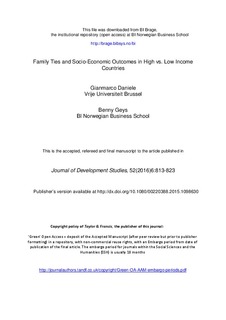| dc.contributor.author | Daniele, Gianmarco | |
| dc.contributor.author | Geys, Benny | |
| dc.date.accessioned | 2015-09-02T22:52:11Z | |
| dc.date.accessioned | 2016-06-15T09:03:10Z | |
| dc.date.available | 2015-09-02T22:52:11Z | |
| dc.date.available | 2016-06-15T09:03:10Z | |
| dc.date.issued | 2016 | |
| dc.identifier.citation | Journal of Development Studies, 52(2016)6:813-823 | nb_NO |
| dc.identifier.issn | 0022-0388 | |
| dc.identifier.issn | 1743-9140 | |
| dc.identifier.uri | http://hdl.handle.net/11250/2392645 | |
| dc.description | This is the accepted, refereed and final manuscript to the article | nb_NO |
| dc.description.abstract | Alesina and Giuliano (J. Econ. Growth, 15(2), 2010) illustrate that strong family ties lead to lower geographical mobility and reduced labor force participation of young and female individuals. We extend their analysis by arguing that the effect of strong family ties on economic outcomes depends on a country’s level of economic and institutional development. This cross-country heterogeneity arises because strong family ties not only foster traditional family values (which have disruptive effects on economic outcomes), but also provide economically valuable social networks – especially in societies characterized by weak institutions and limited market access. Empirical evidence using the European and World Value Surveys (EVS/WVS) is supportive of our theoretical argument | nb_NO |
| dc.language.iso | eng | nb_NO |
| dc.publisher | Taylor & Francis | nb_NO |
| dc.title | Family Ties and Socio-Economic Outcomes in High vs. Low Income Countries | nb_NO |
| dc.type | Journal article | nb_NO |
| dc.type | Peer reviewed | nb_NO |
| dc.date.updated | 2015-09-02T22:52:11Z | |
| dc.source.journal | Journal of Development Studies | nb_NO |
| dc.identifier.doi | http://dx.doi.org/10.1080/00220388.2015.1098630 | |
| dc.identifier.cristin | 1261644 | |
| dc.description.localcode | 2. Forfatterversjon | nb_NO |
